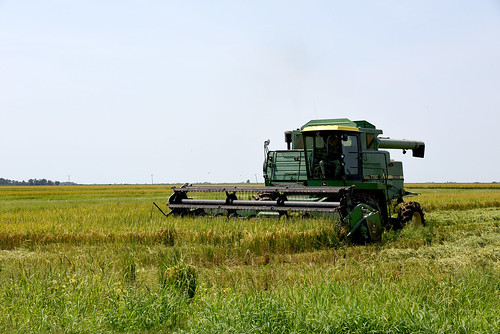Division of Agriculture to begin breeding new lines of BASF rice with Provisia® traits
By Ryan McGeeney
U of A System Division of Agriculture
Fast Facts:
- Breeding will focus on new varieties tailored to Arkansas growing conditions
- Introduction of commercial varieties expected within 4-7 years
(371 words)
Download related PHOTO from Flickr: https://flic.kr/p/VDAdqi
LITTLE ROCK – The University of Arkansas System Division of Agriculture will begin breeding new lines of Provisia rice varieties, which uses non-GMO herbicide-resistant traits developed by BASF.

The Division of Agriculture and BASF signed the breeding development agreement earlier this year. Bob Scott, director of the Rice Research and Extension Center in Stuttgart, Arkansas, said the timing will allow Division of Agriculture researchers to take advantage of the 2019 growing season as the beginning of what will likely be a four- to seven-year process to develop and release commercially viable Provisia rice varieties.
“We are very excited to begin our breeding efforts on BASF’s new Provisia technology,” Scott said. “The Provisia fields I looked at last year were put into some very bad resistant and weedy situations and were still some of the cleanest fields out there.”
Through the new breeding agreement, Division of Agriculture researchers will focus on developing varieties of Provisia that are primarily suited to Arkansas growing conditions.
Donnarie Hales, rice portfolio manager with BASF, said that one of Provisia’s primary strengths is that it allows growers to keep more of their rice acreage in rice production by adding an additional herbicide rotation to their operation.
“For growers who lost a lot of acres to volunteer rice and grass pressure, we saw Provisia provide excellent control last season, which really cleaned up their fields,” Hales said. “We’re excited about the potential of this collaboration and the continued advancement of this herbicide-tolerant technology to help growers continue to grow quality rice.”
John Carlin, director of the Arkansas Crop Variety Improvement Program, said he hoped the cooperative endeavor with BASF would provide Arkansas growers with better tools to achieve maximum yield while minimizing inputs.
“The Division of Agriculture is pleased to continue our collaborative efforts with BASF through which we can provide growers rice varieties developed for Arkansas growing conditions with the latest technologies,” Carlin said.
Follow us on Twitter at @ArkAgResearchand Instagram at ArkAgResearch.
To learn more about the Provisia Rice System, contact your local BASF representative, or visit provisia.us.
About the Division of Agriculture
The University of Arkansas System Division of Agriculture’s mission is to strengthen agriculture, communities, and families by connecting trusted research to the adoption of best practices. Through the Agricultural Experiment Station and the Cooperative Extension Service, the Division of Agriculture conducts research and extension work within the nation’s historic land grant education system.
The Division of Agriculture is one of 20 entities within the University of Arkansas System. It has offices in all 75 counties in Arkansas and faculty on five system campuses.
Pursuant to 7 CFR § 15.3, the University of Arkansas System Division of Agriculture offers all its Extension and Research programs and services (including employment) without regard to race, color, sex, national origin, religion, age, disability, marital or veteran status, genetic information, sexual preference, pregnancy or any other legally protected status, and is an equal opportunity institution.
Media Contact: Ryan McGeeney
U of A Division of Agriculture
Cooperative Extension Service
(501) 671-2120
rmcgeeney@uada.edu
Related Links